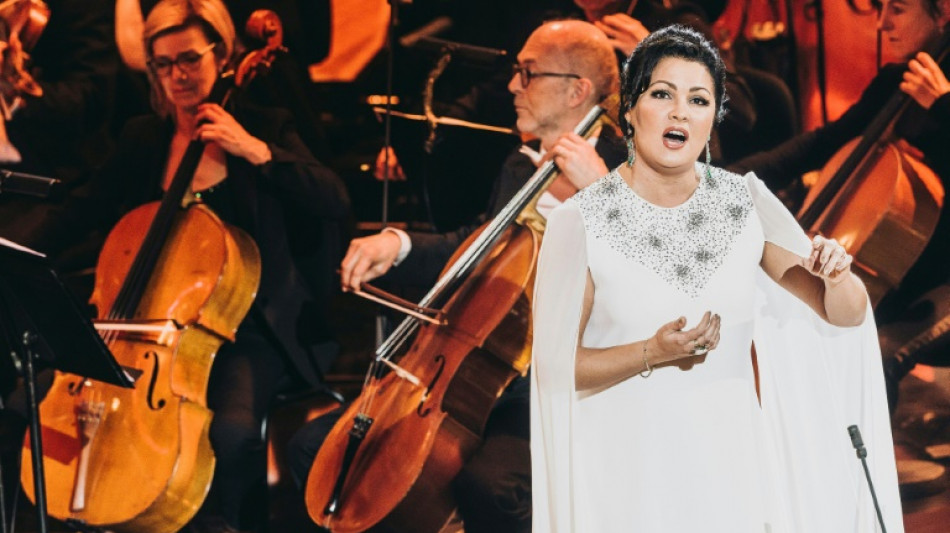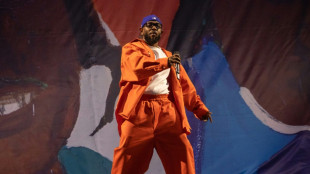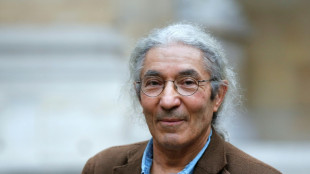
-
 IPL teams set to splash the cash at 'mega-auction' in Saudi Arabia
IPL teams set to splash the cash at 'mega-auction' in Saudi Arabia
-
Olympics in India a 'dream' facing many hurdles

-
 Wounded Bangladesh protesters receive robotic helping hand
Wounded Bangladesh protesters receive robotic helping hand
-
Majestic Jaiswal 141 not out as India pile pain on Australia

-
 Giannis, Lillard lead Bucks over Hornets as Spurs beat Warriors
Giannis, Lillard lead Bucks over Hornets as Spurs beat Warriors
-
Juan Mata agent slammed as 'cowardly' by angry A-League coach

-
 Marta inspires Orlando Pride to NWSL title
Marta inspires Orlando Pride to NWSL title
-
Palestinian pottery sees revival in war-ravaged Gaza

-
 Main points of the $300 billion climate deal
Main points of the $300 billion climate deal
-
Robertson wants policy change for overseas-based All Blacks

-
 Israel retreat helps rescuers heal from October 7 attack
Israel retreat helps rescuers heal from October 7 attack
-
Afghan women turn to entrepreneurship under Taliban

-
 Mounting economic costs of India's killer smog
Mounting economic costs of India's killer smog
-
At climate talks, painstaking diplomacy and then anger

-
 Uruguayans head to polls with left hoping for comeback
Uruguayans head to polls with left hoping for comeback
-
Trump's mass deportation plan could end up hurting economic growth

-
 Iran director in exile says 'bittersweet' to rep Germany at Oscars
Iran director in exile says 'bittersweet' to rep Germany at Oscars
-
US consumers to bargain hunt in annual 'Black Friday' spree

-
 Cheers, angst as US nuclear plant Three Mile Island to reopen
Cheers, angst as US nuclear plant Three Mile Island to reopen
-
Scientists seek miracle pill to stop methane cow burps

-
 Australia ditches plans to fine tech giants for misinformation
Australia ditches plans to fine tech giants for misinformation
-
Developing nations slam 'paltry' $300 bn climate deal

-
 Red Bulls win 'Hudson River derby' to reach conference final
Red Bulls win 'Hudson River derby' to reach conference final
-
Neuville wins world title after Tanak crashes at Rally Japan

-
 Neuville wins world rally title after Tanak crashes in Japan
Neuville wins world rally title after Tanak crashes in Japan
-
Colapinto cleared for Las Vegas GP despite heavy crash

-
 'Smiling One' Amorim vows he has ruthless streak Man Utd need
'Smiling One' Amorim vows he has ruthless streak Man Utd need
-
Marseille down Lens to stay in touch with Ligue 1 leaders, Lyon draw

-
 New Zealand beat 'proud' Italy in Cane's Test farewell
New Zealand beat 'proud' Italy in Cane's Test farewell
-
Barca collapse in Celta draw without Yamal, Simeone hits milestone

-
 Thailand's Jeeno equals Yin for lead at LPGA Tour Championship
Thailand's Jeeno equals Yin for lead at LPGA Tour Championship
-
New Zealand beat Italy in Cane's Test farewell

-
 Marseille down Lens to stay in touch with Ligue 1 leaders, Lyon held to draw
Marseille down Lens to stay in touch with Ligue 1 leaders, Lyon held to draw
-
Liga leaders Barca suffer late collapse in Celta draw

-
 Retegui fires Atalanta top of Serie A ahead of Inter
Retegui fires Atalanta top of Serie A ahead of Inter
-
Greaves hits maiden Test century as West Indies dominate Bangladesh

-
 Venezuela opposition calls for mass anti-Maduro protest on Dec. 1
Venezuela opposition calls for mass anti-Maduro protest on Dec. 1
-
'Fragile' Man City in uncharted territory, admits Guardiola

-
 Erasmus hails Springbok strength in depth after thrashing Wales
Erasmus hails Springbok strength in depth after thrashing Wales
-
Postecoglou calls for consistent Spurs after Man City rout

-
 'We've never lived this situation' admits Guardiola
'We've never lived this situation' admits Guardiola
-
Lebanon says more than 55 killed in Israeli strikes

-
 'We've never lived this situation' admits Guardiola as Man City lose five in a row
'We've never lived this situation' admits Guardiola as Man City lose five in a row
-
Under-fire Gatland 'motivated' to continue as Wales coach

-
 South Africa send Wales crashing to 87-year low in Test rout
South Africa send Wales crashing to 87-year low in Test rout
-
Spurs condemn Man City to fifth straight defeat as Arsenal win

-
 Defeated Leipzig lose more ground on Bayern, Frankfurt go second
Defeated Leipzig lose more ground on Bayern, Frankfurt go second
-
South Africa put Wales to the sword to wrap up season

-
 Spurs thrash Man City 4-0 to end 52-match unbeaten home run
Spurs thrash Man City 4-0 to end 52-match unbeaten home run
-
Defeated Leipzig lose more ground on Bayern


Cold shoulder for Russian artists sparks debate over cultural boycotts
As Moscow's invasion of Ukraine enters its third week, a pall has fallen over Russian artists, long crown jewels of a country whose fine arts are an eminent source of soft power.
Superstar operatic soprano Anna Netrebko and renowned conductor Valery Gergiev are among the luminaries axed from performing on the global stages they have long graced -- but do cultural boycotts work?
The freezing out of artists who have espoused pro-Kremlin views -- or who receive funding from the Russian state -- recalls similar measures taken over apartheid-era South Africa or against Israeli institutions in solidarity with Palestinians as part of the BDS movement.
Jane Duncan of the University of Johannesburg, who has studied the power of such boycotts as political change agents, said isolation campaigns based on culture as well as sports can be "highly effective, because they can have a huge psychological impact."
"Russia over a number of centuries now has prided itself on its intellectual, artistic and sporting achievements. It's become part and parcel of its identity and its projection of soft power globally," the academic told AFP.
"I think we've already seen that there's a lot of dissent within Russia about the invasion of Ukraine, and a cultural boycott may well intensify that."
Duncan cautioned, however, that a "blanket cultural boycott" could hurt anti-regime artists: in early 1980s South Africa, for example, she said, a form of "double censorship" emerged, where both the apartheid state and "artists who came from the liberation movements" were subject to shunning.
"That led to a situation where you couldn't actually hear the voices of the oppressed and the exploited expressed through art, through music, through drama, because they weren't allowed outside of the country."
Emilia Kabakov, a multidisciplinary Ukrainian artist who has lived and worked with her husband Ilya in New York for decades, warned against punishing creatives -- and anyone -- simply on the basis of nationality.
"I know that Russian artists right now have problems," the 76-year-old born in the Soviet city of Dnipropetrovsk, now known as Dnipro in Ukraine, told AFP.
But she suggested those Russians who live and work abroad may have a reason, saying: "Did anybody think, why are they here? Because they can't live there... they want a normal life, unrestricted."
"You don't have to work with collaborationists, but you have to work with Russians, and Ukrainians, and everybody else."
- Where is the line? -
The stance Kabakov evoked is the approach Duncan deemed appropriate -- to "steer clear" of boycotts based purely on nationality that "could lead to a very dark and difficult place."
The scholar pointed to the BDS (Boycott, Divestment, Sanctions) movement as having a "much more sophisticated position on the cultural boycott" than was the original case in South Africa, promoting a selective rather than blanket ban.
Queried by AFP, the cultural and academic boycott arm of the BDS movement said in a statement the measures they advocate for are "strictly institutional" and do "not target individuals."
Leaders of major cultural institutions including New York's Metropolitan Opera, Paris' Philharmonic, and other European venues in recent weeks have said the scope of their boycott is focused on artists who back Russian President Vladimir Putin, not everyone with a Russian passport.
"If somebody is a tool of the state, they probably won't be working with the New York Philharmonic," the orchestra's CEO Deborah Borda told AFP.
"There is a line that is very clear," said French Culture Minister Roselyne Bachelot. "We don't want to see representatives of Russian institutions or artists who clearly support Vladimir Putin."
But in cases elsewhere, critics fear that line is blurred: the Polish Opera scrapped its production of Mussorgsky's 19th century opera Boris Godunov, and the Zagreb Philharmonic cut two Tchaikovsky compositions from a performance.
Dostoevsky began trending after a Milan university tried to postpone a course about the classic Russian novelist behind "Crime and Punishment" -- who spent four years in a Siberian labor camp after reading banned books in Tsarist Russia.
The university backtracked following the social media uproar.
- 'Cancel culture' -
When it comes to contemporary artists' political responsibility, Duncan said "one can make the argument that producing the art and getting it out there is stance enough."
"We also want to avoid putting artists on the spot to make political statements when perhaps they don't feel comfortable with doing that," she continued.
Feeling pressure to speak out on Putin's war in Ukraine, Russian conductor Tugan Sokhiev left his posts at Moscow's Bolshoi and with the orchestra of Toulouse.
In a lengthy statement, Sokhiev said he "will always be against any conflicts in any shape or form" but said he felt "forced to face the impossible option of choosing between my beloved Russian and beloved French musicians" -- so he quit both.
Saying he and colleagues were "victims" of "cancel culture," the conductor insisted "we musicians are the ambassadors of peace."
"Instead of using us and our music to unite nations and people, we are being divided and ostracized," he said.
G.Schulte--BTB



